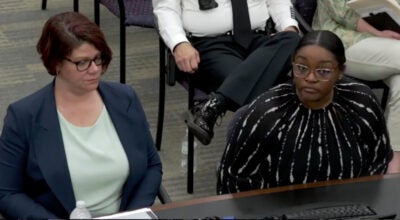NC Dems chairman to leave over discrimination flap
Published 12:00 am Thursday, April 19, 2012
RALEIGH (AP) — The chairman of the North Carolina Democratic Party said Thursday he won’t seek re-election next month after days of being pressured by party notables to step down in the fallout over sexual harassment allegations at party headquarters.
David Parker said he still won’t resign immediately, but a meeting to pick his successor could be held as early as May 12.
Several Democratic elected officials, including Gov. Beverly Perdue, called on him to resign because his presence leading the party had become a distraction. The accusations in a sexual harassment case by a former party employee against party Executive Director Jay Parmley had siphoned all of the political air in North Carolina in advance of the May 8 primary election.
“We need to have an orderly transition. We’ll have a meeting as quickly as our rules provide,” Parker told reporters at a news conference at the party’s Raleigh office.
Parker had labeled the June 17 State Executive Committee meeting as a referendum on his future, but on Thursday he said he wouldn’t seek to remain at the post after all.
Parmley resigned last weekend but denied any harassment. Wednesday’s disclosure of a complaint filed with the Equal Employment Opportunity Commission against Parmley provided new details about the allegations.
Parker’s departure seemed to satisfy state and national Democrats. Perdue released a statement saying she was pleased.
“The party must move quickly to select a new chair and a new executive director,” Perdue said. “It’s time to resume our focus on the core mission of the Democratic Party: strengthening our schools, creating jobs, and ensuring more opportunity for all North Carolinians.”
Democratic National Committee Executive Director Patrick Gaspard identified Parker’s move as a resignation that was “in the best interest of the party.” The turmoil threatened to harm Democrats as preparations build for the party’s national convention in Charlotte in September and President Barack Obama’s re-election campaign in a key battleground state.
Parker clearly was frustrated with his departure in a political world he said thrives on a “rush to judgment.” He said many Democrats are urging him to stay on and fight. He declined to name his supporters.
Former party employee Adriadn Ortega filed a federal complaint Jan. 31 alleging he was fired despite assurances he would not be terminated after he told officials in the organization that Parmley was harassing him. The AP typically does not identify victims of sexual harassment but Ortega gave the AP permission to identify him.
Parker, a Statesville attorney, spent most of his 35-minute news conference defending his actions and said he followed the party attorney’s advice. He said both Ortega and Parmley had rights and protections under the law.
“We have to do what is right. We have to do what is moral,” Parker said. “I am not going to change the standards by which I have lived my life and which I have practiced law in order to succumb to political pressure. I’m simply not going to do that.”
Parker read a December letter that he identified as a counteroffer by Ortega in seeking a severance package after his termination last November in which Ortega alleged several actions by Parmley against him.
Parker said his investigation of what happened found several of the more sensational allegations to be false or misinterpreted. He pointed out they weren’t included in the sworn EEOC complaint by Ortega.
According to Parker, all that stood were allegations that Parmley gave Ortega unwanted shoulder rubs and touched his leg while he drove and Ortega dozed in the back seat. Parker determined the allegations weren’t sufficient to warrant Parmley’s firing.
“We’re down to a whack on the leg to wake him up … and unwanted shoulder rubs that don’t amount to a hostile environment,” Parker said.
Ortega did not respond to a request Thursday for a response to Parker’s characterization of the allegations. Parker said he didn’t want to settle the case but followed the recommendations of party attorney John Wallace and signed the agreement, which was confidential.
Leading Democrats and rank-and-file activists were unhappy that they were unaware of what had happened and with Parker’s handling of the issue.
Parker said he was barred by law from telling members of the state’s 41-member Executive Council what was going on because they weren’t the worker’s direct supervisor. Parmley was Ortega’s direct supervisor.
“Sometimes attorneys give advice that is right but is not politically safe. Such is the case here,” said Parker, who identified the chairman as a part-time job. “I chose to do what was right, rather than what was easy. I’m standing before you today because of that decision and I am fine with it.”
Ortega said in the complaint he was sexually harassed between early September and late November. Ortega said in the complaint he discussed the harassment with the party’s director of administration in September and that his supervisor told him on Oct. 1 that he had been advised of the allegations.
After meeting with another party operative, identified by Parker as former party Executive Director Scott Falmlen, Ortega said he was told that there would be no retaliation for his complaint. Ortega was no longer harassed but he was fired in November, Ortega wrote. Parker said he couldn’t talk about why Ortega was fired, citing personnel law.
More News



